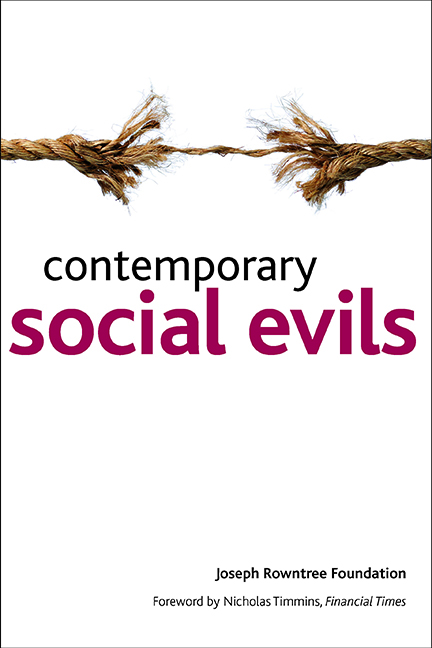Book contents
- Frontmatter
- Contents
- Foreword
- Acknowledgements
- Notes on contributors
- 1 Introduction
- 2 ‘Social evils’ and ‘social problems’ in Britain since 1904
- Section 1 Public Voices
- Section 2 Viewpoints
- A decline of values
- Distrust
- The absence of society
- Individualism
- Inequality
- Section 3 Reflections
- Appendix: How the ‘social evils’ consultations were organised
- Index
11 - Fear and distrust in 21st-century Britain
Published online by Cambridge University Press: 26 January 2022
- Frontmatter
- Contents
- Foreword
- Acknowledgements
- Notes on contributors
- 1 Introduction
- 2 ‘Social evils’ and ‘social problems’ in Britain since 1904
- Section 1 Public Voices
- Section 2 Viewpoints
- A decline of values
- Distrust
- The absence of society
- Individualism
- Inequality
- Section 3 Reflections
- Appendix: How the ‘social evils’ consultations were organised
- Index
Summary
Monica tells me that when she moved into a gated community after 20 years living on an ordinary terraced street in London, she expected to feel safer. But recently the electronically controlled gates surrounding her development went wrong and had to be propped open. As a result, she spent the whole night lying awake, feeling far more scared than she had ever been in her terraced house, despite more-than-adequate locks on her new front door. Two hundred miles to the north, in a very different part of Britain, higher security is also creating an atmosphere of increased fear. In part of Salford, designated a ‘Respect Action Area’ by the government, two teenage boys report being stopped and searched by police at least once or twice a week. Curtis, 16, and Scott, 17, explain to me how this routine occurrence makes them feel bullied and belittled. ‘Respect’ in their experience feels a lot like humiliation.…
One of the ironies of contemporary British society is how little our increasingly heavy investments in security have done to make us feel safer. All over the country, people are experiencing a corrosive climate of fear, and the media's commercial needs, rather than any mission to inform, have played a significant role in heightening it. Stories that sell fear, sell newspapers.
The interaction between the media and policy making is critical because more and more policy is made in response to headlines rather than rigorous research. Ill-thought-out, short-term responses can then be ‘spun’ to generate the headlines the government wants. The real causes of fear and distrust are swept under the carpet, where they multiply rather than go away. Policies that tackle symptoms rather than causes mesh with the spin culture, to sell us control-based solutions that only make things worse. People are, not surprisingly, fed up with the spin that is breaking the ties between citizens and politics, and adding to distrust. The government often accuses the public of apathy and talks of the ‘disconnect’ between people and politics. But the real problem is not apathy or lack of interest, but a lack of trust – which in turn correlates with the rising levels of fear in society (Layard, 2006).
Inequality and segregation
From the Second World War to the present day, a large body of evidence has demonstrated how levels of inequality in societies are linked to distrust.
- Type
- Chapter
- Information
- Contemporary Social Evils , pp. 135 - 146Publisher: Bristol University PressPrint publication year: 2009



